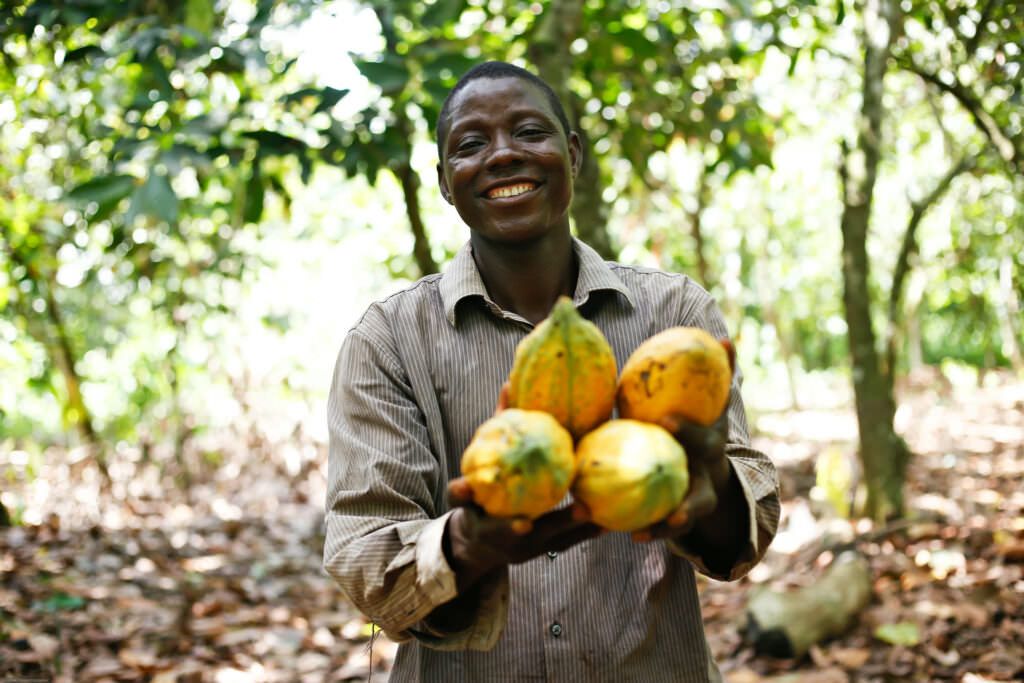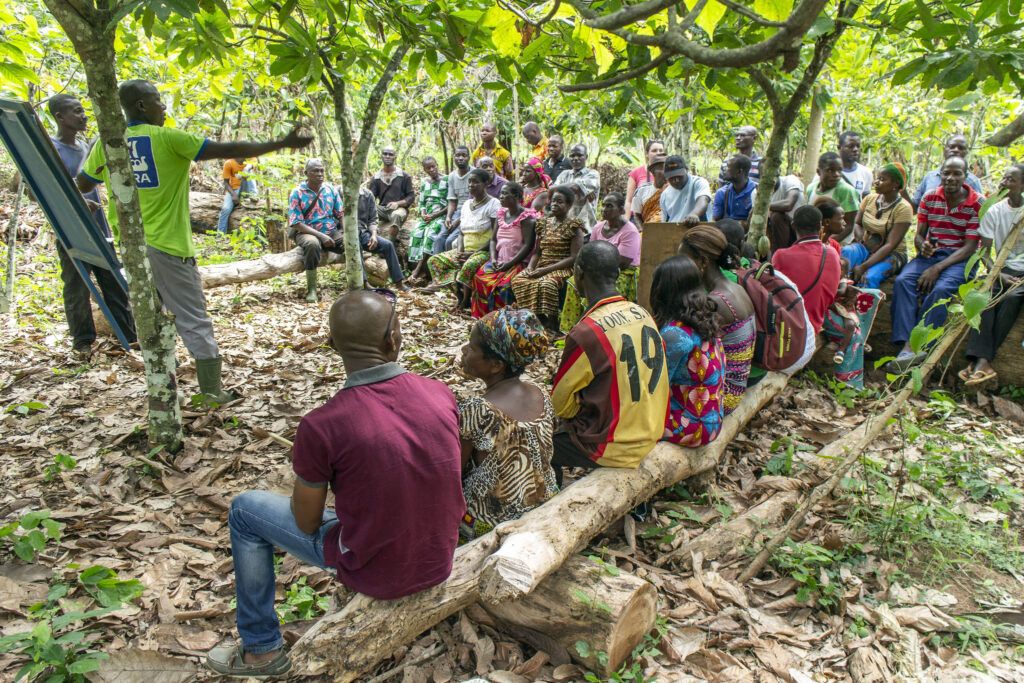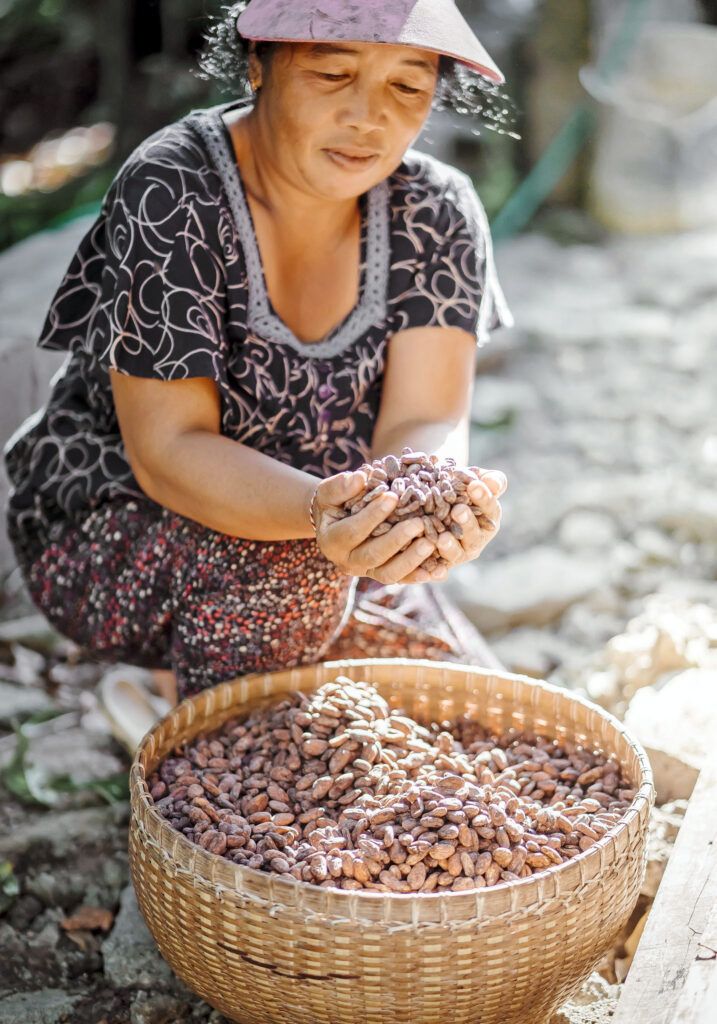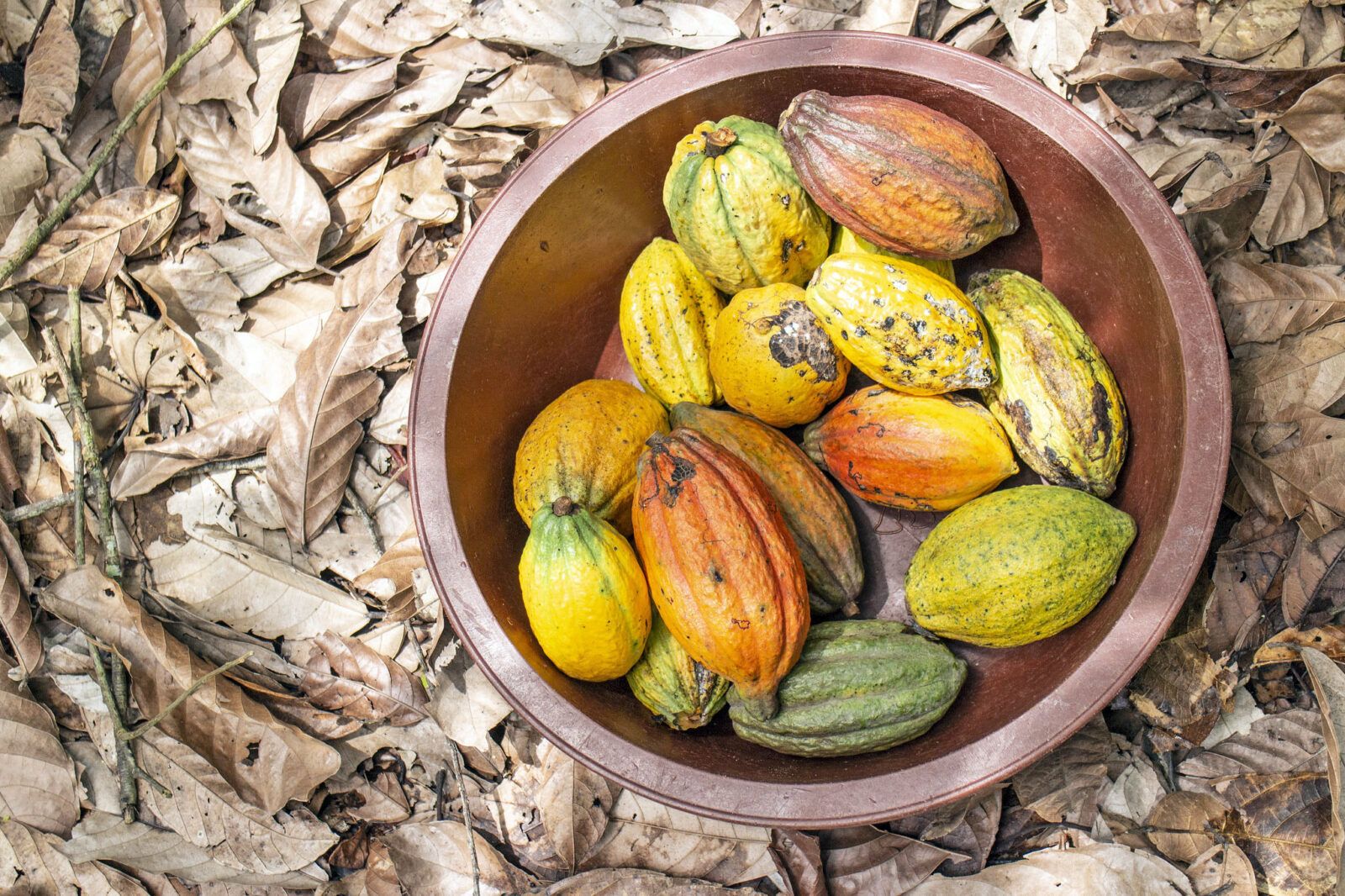It should come as no surprise that global demand for cocoa is booming—after all, cocoa is the essential ingredient in one of the world’s most beloved treats: chocolate.
And yet, despite this robust market, two-thirds of cocoa farmers live on less than US $2 per day. Such crushing poverty can lead cocoa families to keep their children out of school to help on family farms or to move into protected forest areas in search of more fertile land.

To combat these challenges, the Rainforest Alliance works with almost one million cocoa farmers—mostly in West Africa, where 70 percent of the world’s cocoa is grown—to build thriving livelihoods and climate resilience through certification and training. Our certification program also tackles sector problems (like child labor and deforestation) with thoughtful, holistic, and technology- and data-powered approaches that are informed by our many years of experience.
Because the Rainforest Alliance is committed to continuously improving our interventions, since 2019 we have implemented additional measures to strengthen auditing and provide more support to certified farmers in West and Central Africa. We further girded these efforts with a US $5 million Africa Cocoa Fund that helps farmers in West and Central Africa who need the most assistance in meeting our certification requirements.
Healthy forests and vibrant communities are an essential part of the global climate solution. Sign up to learn more about our growing alliance.
Human rights: A holistic approach to stopping child labor on cocoa farms
Approximately 1.5 million children are engaged in child labor in cocoa production in Côte d’Ivoire and Ghana alone.
Child labor has always been prohibited on Rainforest Alliance Certified farms. But over the course of our many years in certification, we have learned that a simple ban on child labor is not enough.
This is why our certification program now tackles child labor in a more holistic way, taking what we call an assess-and-address approach. The program requires certified farms and processing facilities to set up internal committees to prevent and monitor child labor, and to quickly remediate any cases that might be found. (Farms also receive training in how to do that.) An auditor evaluates the processes these farms establish and looks for signs of child labor during audits.
A women-led cocoa cooperative in south Côte d’Ivoire illustrates how effective assess-and-address can be, especially when paired with financial support from the Africa Cocoa Fund. Kole Minrienne, board chair of the Société Coopérative Agricole Fraternité d’Adzopé (SCAFRA) explained that these funds enabled her co-op to train members in understanding and mitigating child labor risks, run awareness-raising activities in the community, and survey local families to learn if they have children who should be in school. Finally, the fund helped the co-op purchase 3,000 hens as a way of increasing the incomes of their members’ families—money that helps parents hire help for farms (instead of using children) and pay school fees. “The Africa Cocoa Fund helped us a lot,” Minrienne said.
We also take an assess-and-address approach to forced labor, discrimination, workplace violence, and harassment.
Protecting forests: A ground-breaking advance in certification auditing
Côte d’Ivoire and Ghana, which together produce nearly two-thirds of the world’s cocoa, lost 25 percent and 8 percent (respectively) of primary forest between 2002 and 2019. Cocoa farming was a significant driver of this forest loss.

To help prevent the expansion of cocoa farms into forests, the Rainforest Alliance now uses GPS mapping and satellite imaging of farm-forest border areas—a ground-breaking development in certification auditing. In the past, auditors had little information about where cocoa plots ended and forests started. But now, our 2020 Certification Program requires all certified farms to be GPS mapped; we then cross-reference these maps with customized risk maps that we’ve created to identify deforestation hot spots in cocoa-producing regions. This allows auditors to better spot possible forest encroachment, and to take swift action if they do. We also visit farm groups ahead of their audits to help them prepare, and to implement corrective actions if necessary.
In addition to protecting forests, our program requires farmers to increase native tree cover on and around their land, while promoting other biodiversity-boosting measures like agroforestry—the practice of planting shade trees among cocoa crops.
Tackling sector challenges at the root: Improving farmer livelihoods
The single most significant driver of child labor and deforestation is poverty. Cocoa farmers receive a mere six percent of what a chocolate bar sells for in the supermarket. They are on the losing end of the supply chain, too, bearing the brunt of chronically low prices.
Adopting the more sustainable farming methods included in our certification program is one way to improve farmer incomes. By using manual and natural pest control techniques, for example, farmers avoid spending money on expensive agrochemicals while creating healthier soils; because better soils are good for yields, the farmer both reduces costs and improves income. In fact, three studies* published between 2018 and 2020 found that incomes on certified cocoa farms in Ghana and Côte d’Ivoire were 40 percent higher on average than incomes on non-certified farms.
The program also includes requirements for good farm management practices. The Rainforest Alliance also helps farmers look more holistically at the economic risks and opportunities in their environment. Our program provides (and requires use of) a tool, for example, that digitalizes farm-level data, thereby giving farmers a way to analyze performance and make better business decisions. A farm risk assessment tool helps farm groups create management plans based on risks such as climate impacts. It also collects data on how members make a living so ways of increasing profitability or diversifying income streams may be considered.
Given the low market price for cocoa, the cost of becoming more sustainable is more than most farmers can afford—and there is no reason that the burden of meeting certification costs should rest so heavily on farmers who are already struggling. To address inequities in the supply chain, cocoa buyers participating in our program are required to make Sustainability Investments and pay a minimum Sustainability Differential, a mandatory additional cash payment to certified farms over and above the market price.
Cultivating climate-change resilience

Drought, pests, and diseases can decimate a cocoa harvest—and a bad year can be devastating for cocoa farmers already struggling to make ends meet.
The climate-smart methods in our certification program help farmers combat the threats posed by climate change. Because climate challenges differ region to region, farms first conduct an assessment to identify their specific climate risks and vulnerabilities; then they follow the practices in the program tailored to their needs. In Indonesia, for example, cocoa farmers struggle with prolonged dry seasons and extreme weather events, so their methods might include planting cover crops and planting locally appropriate shade trees to help minimize heat stress and soil erosion.
Another important climate-smart strategy covered in our farmer trainings is diversification, which helps spread climate risk. Farmers can diversify their income streams by growing different kinds of crops, raising animals, or cultivating honey—all to provide an important hedge against the unpredictability of farming.
A strengthened cocoa program
We are pleased to report that the additional measures we began taking in 2019 to strengthen our cocoa program succeeded in establishing stronger systems to identify and manage risks; provided targeted audits for those farms at high risk for failing to meet certification requirements; and increased farmer awareness of forest encroachment and child labor. The Africa Cocoa Fund continues to bolster farms seeking to increase their sustainability and meet certification requirements.
The Rainforest Alliance remains committed to improving the well-being of cocoa families and the health of their landscapes in West Africa and around the world.
*Brako et al. 2020; Iddrisu et al. 2020; Ingram et al. 2018
